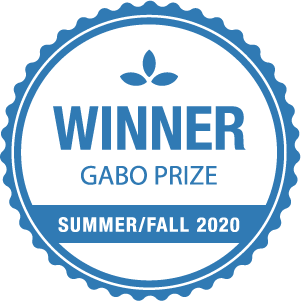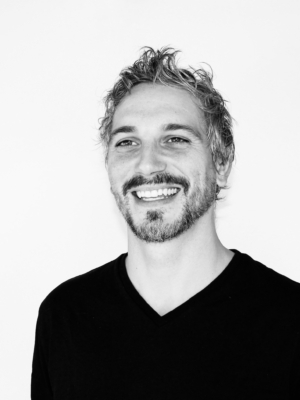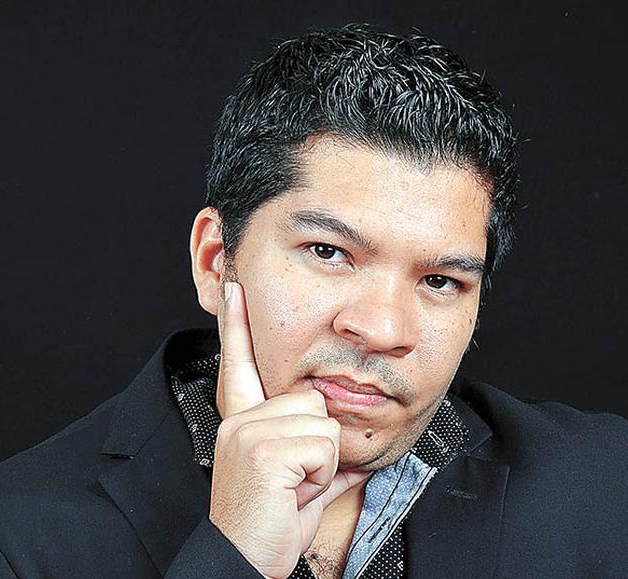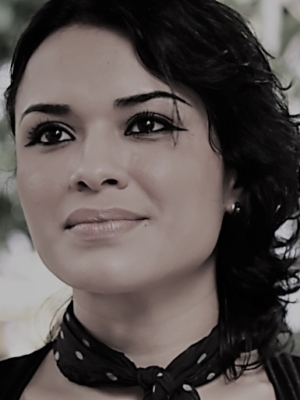Panama, whether in the Pacific or the Atlantic, and other poems
Panama, whether in the Pacific or the Atlantic (Javier Alvarado)
Panama, on this street and in this time we’re missing,
Before my days and nights
(And from this poem) oscillating like water between lilies,
With its fortified walls and buildings
Whose mirrors lend a touch of color,
To the sea creatures that assemble in the deep
To my child’s lamp and my feverish poet hand.
For centuries, I missed the day
Of opening my eyes and feeling the earth
And dust from my birthplace,
Where I transformed into a great-tailed grackle
Or a statue of flying fish trapped in marble.
Panama, like entering a muse
—vein by vein—
A rainbow in my mouth,
The whirling compass between spirit and flesh,
A city in my skin, corporeal
Like organ music during the rainy season
Or a drum in a surge of heat.
I always reach her, even if by other paths,
Leaving fire, leaving love, colloquiums,
Poetry. My heel always pivots to the magic
Of her moss, to her daring stones,
To her jungle where I’ve never been, and will never return,
Where I inhale the world’s truth,
Full with salt until the border of its shores.
Where to leave the wall, the trapeze
And the marks of childhood like a butterfly on a hat,
The bare field
Where I chase gnomes and phantom fireflies,
Images of God or a horse that relishes
The imaginary ramblings of a toucan in the storm?
Panama,
In the Pacific, in the Atlantic,
Where are you? Where have you been?
Do you find me by sea and the canal,
Its bereaved memorial? Panama, it’s you I always
Find even by other paths,
Where I whistle to the creatures that assemble in the deep,
With my child’s lamp and my feverish poet hand.
Death and its ship (Javier Alvarado)
Death returns blindly by ship
And spits out black slaves. Each piece of its merchandise
Returns from galleon-shaped dreams––
Its sobs submerge within us.
Sometimes I wonder who my parents call out to
From their old age and its myriad voices;
Why my grandparents repeat the same habits
Of talking about nothing
Or spreading out their photographs
In a mirror of fog.
Right now, everything is present, nothing concealed.
I watch the grandchildren play, who will sing forever
If there is pitch over the ports
Or amused seagulls perched on masts and ropes
Full of ranting roosters.
There’s no greater mystery than a sea
And its submerged sobs,
Those moaning gods
That yawn steadily and fill their mouths with stories
Of seals and whales.
It’s this fear of inhaling salt
Here in the port where my triton or admiral’s
Body rests,
To write the same poems
That have lapped the spuming stars, or
To recall the ballad that reaches the mouth of razor clams,
Who full of fever, shout their orgasms;
To vegetate in the mirror until I become a bloated snail,
Or the oceanic fury of a recurring tsunami.
I cast a line and witness the collection of these images.
These truths that tremble and whirl in the deep
Of nothingness like fish protected from the serene air
Or dry bubbles that waver
In my hands like jellyfish.
Death will take me to every port,
And it will fold my pants and the rest of my baggage.
I’ll be darker or brighter when setting off to view
The hosts and legends of other waters. I’ll be young or old
Or maybe oblique like all things born of light.
Sometimes I think that each day
Death prepares us to embark on its ship.
III (Lucía Estrada)
The air opened slowly with the bell’s
sound, and in the rooms
each thing took its place and name.
Everything was possible under that winter light in which you
pointed to a dark garden
where an empty pond waited to catch my eyes.
It was necessary to look carefully before it faded
in the shade.
We were immersed in the landscape, and the voices
of the garden came from inside,
and the forms found their place among
themselves.
You said something about emptiness, and in the distance
the fountain grew radiant in its gloom.
This is what we dream. We sink in
transparency
and in the movement of light. She goes over
what for us
has lost its mystery. Here are all the newly
discovered things,
and the world, more and more full of itself,
increasingly true.
I can hear the whisper of opening doors leading us
to a deeper silence, and we dig into it
even though the voice’s strings have weakened.
The pond will cover itself with water. I sense it.
It is dark and rises to your eyes and fills you
with strangeness.
But in front of you, nothing will lose its clarity.
Let your heart get closer to death,
and there you will find luminous things.
It will be as if you had never
gotten out of the way: “To resist is everything.”
The mask of bone (Lucía Estrada)
The mask of bone
won’t reveal
if the features it conceals
are those of a god,
or of a beast
or of both, which, after death
keep fighting
for the same crown.
![]()
POEMAS
(Javier Alvarado y Lucía Estrada)
Panamá, ya sea en el Pacífico o en el Atlántico
Panamá en esta calle y en este tiempo que nos falta,
Antes de mis días y mis noches
(Y del poema) fluctuando entre los lirios como el agua,
Con sus gruesas murallas y sus edificios
Que le dan color de tacto a los espejos,
A las criaturas del mar que se advienen a mi fondo,
A mi lámpara de niño y a mi mano afiebrada de poeta.
Nunca antes por siglos volví a ver el mismo día
En que abrí los ojos tanteando la tierra
Y el polvo del lugar donde ocurrió mi nacimiento,
Donde me convertía en talingo y en estatua
Con peces de aire entrando por el mármol.
Panamá fue una musa entrando
-vena a vena-
Un arcoíris en la boca,
El tamaño de una brújula en el eros y en la gnosis.
Una ciudad en mi piel, como algo corpóreo
Como la música en una temporada de lluvia
O como un tamborito en una oleada de calor.
Siempre llego a ella aunque por otros caminos vaya
Dejando fuego, dejando amor, coloquios,
Algo de poesía. Mi talón siempre regresa al milagro
De su musgo, a sus piedras temerarias,
A su selva donde nunca he ido, donde nunca vuelvo,
Donde respiro la verdad del mundo
Ensalinada al borde de sus playas.
¿A dónde dejar el muro, el trapecio
Y las marcas de la reniñez como una mariposa en el sombrero,
El desnudo campo
Por donde persigo duendes y espejismos de luciérnaga,
Imágenes de Dios o de un caballo que atesora
Las caminatas imaginadas por el tucán en la tormenta?
Panamá
En el Pacifico, en el Atlántico,
¿En dónde está?, ¿en dónde estuvo?,
¿En dónde me encuentra el mar con su Canal
Y su memorial dolido? Panamá la que siempre
Encuentro aunque por otros caminos vaya
Donde silbo a las criaturas que se advienen a mi fondo,
Con mi lámpara de niño y mi mano afiebrada de poeta.
—Javier Alvarado
La Muerte y su barco
La muerte regresa a tientas con su barco
Escupe sus negros esclavos, sus piezas de mercadería
Regresa desde los sueños en forma de galeón o de canoa
Es en nosotros que vive con su llanto sumergido
A veces me pregunto a quien llaman mis padres
Desde la senilidad con sus tantas voces;
Por qué se repiten mis abuelos en los mismos hábitos
De hablar con la nada
O de esparcir sus fotografías
En el garabato de la niebla?
Aún no se esconden las cosas presentes y los veo
Jugar con los nietos, que permanecerán cantando para siempre
Cuando hay brea sobre estos puertos
O gaviotas confusas que se posan en los mástiles y en las cuerdas
A diatribar con los gallotes.
No hay más misterios nivelados que observar el mar
Y su llanto sumergido,
Esos dioses gemebundos
Que bostezan despacio o que se llenan la boca con fabulaciones
De foca o de ballena.
Es este miedo a respirar las sales que ya conozco
A visitar esos puertos donde se quedó mi cuerpo de tritón
O de almirante,
Escribir los mismos poemas
Que circularon con las estrellas de la espuma, o recordar
Esa balada que va en la boca de los longorongos
Que gritan sus orgasmos repletos de fiebre;
Vegetar en mi espejo que se vuelve un caracol henchido
O una furia oceánica que se repite como un triste maremoto.
Por eso atestiguo el recolectar con mi caña de pescar estas imágenes.
Estas verdades que tiemblan y se agitan en el fondo
De todas las nadas como peces que resguardan la tranquilidad del aire
O como burbujas secas que se quedan vacilando
En mis manos como medusas.
La muerte me llevará a todos los puertos
E irá doblando mis pantalones y mis restos de equipaje.
Seré más oscuro o luminoso cuando recorra
Las huestes y las epopeyas de otros mares, seré joven o viejo
O quizás oblicuo como todo resplandor que nace.
A veces creo que cada día
La muerte nos prepara para entrar en su barco.
—Javier Alvarado
III
El aire de abrió lentamente con el sonido de las
campanas, y en los cuartos,
Cada cosa ocupó su lugar y su nombre.
Todo era posible bajo esa luz de invierno en la que
señalaste un jardín cerrado,
Un estanque vacío esperando por mis ojos. Era preciso
Mirarlo con atención antes de que se diluyera
en la sombra.
Estábamos inmersos en el paisaje, y las voces
del jardín venían desde adentro,
Y las formas encontraban entre sí su
correspondencia.
Algo dijiste del vacío, y a lo lejos,
La fuente brilló en su penumbra.
Esto es lo que soñamos. Hundirnos en
a transparencia
Y en el movimiento de la luz. Ella recorre paciente
lo que para nosotros
ha perdido su misterio. Aquí están todas las cosas
recién descubiertas,
U el mundo, cada vez más pleno de sí mismo,
Cada vez más verdadero.
Puedo escuchar el rumor de las puertas que se abren
Para conducirnos a otro silencio, y cómo cavamos en él
Aunque las cuerdas de la voz se hayan debilitado.
El estanque se cubrirá de agua. Puedo presentirla.
Es oscura y asciende hasta tus ojos llenándote
de extrañeza.
Pero delante de it, nada perderá su claridad.
Deja que tu corazón entable cercanía con la muerte,
Que allí también encontrarás presencias luminosas.
Será entonces como si nunca
Te hubieras apartado del camino: “El resistir lo es todo.”
—Lucía Estrada
La máscara de hueso
La máscara de hueso
se niega a revelar
si los rasgos que oculta
son los de un dios
o los de una bestia
o si de ambos que, tras la muerte,
continúan combatiendo
por una misma corona.
—Lucía Estrada
![]()
TRANSLATORS’ STATEMENT
Not being a native Spanish speaker and far from fluent, it’s the initial score of music and images that lure me across the lanes of translation. In both Javier and Lucía’s poems, there is a sense of magic and mystery within the words and between the lines. In Javier’s poems, this emotion is more explicit; the excitement and love of his country comes through the bombardment of images and long sentences. Whereas, in Lucía’s poetry, the emotion is sharpened by her detailed use of imagery. Here, her poetry awakens and stirs that which we cannot touch, but which we feel. In both of these poets’ work, the music is the sea on which these images sail and lead us to new lands.
Russell Karrick is a poet/translator living between Colombia and New York. He is a student of Fairleigh Dickinson’s low-residency MFA program in creative writing. His poetry and translations have appeared or are forthcoming from World Literature Today, Magma Poetry, Jet Fuel Review, Blue Earth Review, and others.
Javier Alvarado is a Panamanian poet who has won national and international poetry awards, including Honorable Mention for the Casa de la Américas Prize, the Central American “Rogelio Sinán” Prize, the Nicaraguan “Ruben Dario” International Prize, and the “Nicolás Guillén” International Prize. In 2014, Javier was awarded the Medardo Ángel Silva Prize for his collection, Carta Natal al país de los Locos. In 2015, he received the Rocardo Miró Poetry Prize, the highest award for Panamanian letters. In 2017, he obtained the Hispano-American Prize for Poetry in San Salvador, and in 2018 he won the Hispano-American Juegos Florales Prize of Quetzaltenango, Guatemala. Most recently, he was an Honorable Mention for the Fernando Rielo World Prize for Mystical Poetry. Javier has written eighteen books of poetry and published two anthologies.
Lucía Estrada is a Colombian poet and the author of seven collections of poetry. She has won numerous local and national awards, to include the National Poetry Prize for her most recent collection Katábasis. Her work has appeared in a variety of national and international publications, and has been translated into English, French, Japanese, Greek, Swedish, Portuguese, Italian, and German. Eulalia Books (United States) will be publishing a bilingual edition of her collection Katábasis later this year.








